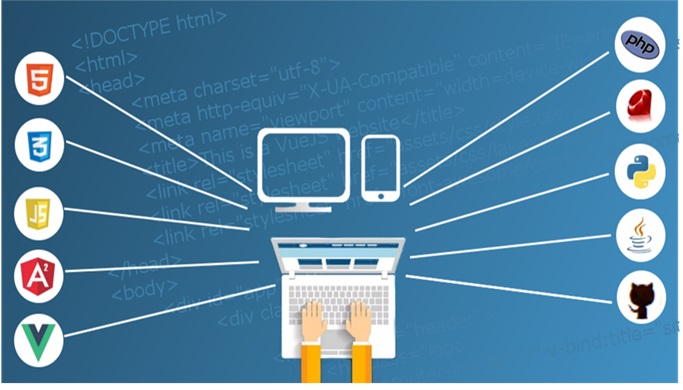What is Full Stack Development and Does Your Small Business Need It?

80{db9acdd2b5204ea72ac6ab2312f7630b6e282665344bcd151a43454148e44b67} of small businesses don’t fully use all the technology available to them. Businesses that do fully use technology are more likely to experience four times the revenue growth annually.
No matter if you’re a startup or an established business, you’re going to lose potential customers if you don’t add technology like websites or apps to your small business. This technology also must be easy to use and make sense for your business.
But hiring a dozen different developers is not in most small business budgets. So if technology isn’t your strong suit, then full-stack development might be the perfect solution you’re looking for.
Ready to learn about what full-stack development is and how it can help your small business? Below is everything you need to know to decide if hiring a full-stack developer is right for you.
What Is Full-Stack Development?
Full-stack developers know how to develop both client and server software. In tech terms, you’d call these the front end (client software) and the back end (server software).
Usually, software developers focus on either the front end or the back end. But with a full-stack developer, they can design the application, code it, code the client-facing side, and manage the database.
Full-stack developers are also masters of several programming languages and have a broad range of skills. These include:
- HTML
- CSS
- Programming browsers using languages such as JavaScript
- Programming servers using PHP, Node, and more
- Programming databases using SQL, MongoDB, and more
One of the biggest benefits of having a full-stack developer is that they’re able to quickly switch from one development environment to another. They also have a complete understanding of each layer of a development project.
Is a Full-Stack Developer Right for Your Business?
Since full-stack developers have such a wide skill set, they’re the perfect choice for businesses that are just starting out. Not only are they great problem solvers, but they can create all the software your business needs to get started.
Full-stack developers are also great problem solvers. Hiring one is a great option if you can’t afford to hire multiple specialists to start with.
But let’s say you’re already an established business and only need help with one specific thing. Or, you may only need help with one very complex project. In this situation, you’d want to get the help of a highly specialized developer instead.
One negative that many people say about full-stack developers is that they’re generalists rather than specialists. While this is true, you can always invest in new skills for your full-stack developer as your company grows.
This way, your full-stack developer turns into a specialist depending on the changing needs of your company.
Some of the top reasons to hire a full-stack developer include:
Versatility
Since full-stack developers can use many different programming languages, they’re like the jack-of-all-trades of development.
For example, let’s say you’re a tech startup looking to revolutionize the way people go to the gym. You envision having an app that helps users count calories, log exercise, track lifestyle habits, and more.
Your startup will at least need:
- An app
- A website
- Perhaps an online forum for users
Having a full-stack developer on your team means that you won’t have to worry about web development. Your developer will work with your graphic design team to design the apps and will then code everything.
They’ll also know how to test your app to make sure it’s working on the software side and is easy for customers to use.
This also makes things easier for you as the business owner. Instead of having to go back and forth between front-end and back-end developers, you only have to contact your full-stack developer.
Plus, front-end and back-end developers tend to work separately and do not know much about what’s going on outside of their own work. But a full-stack developer will know what’s happening with each part of the project as you move forward.
Lowered Costs
Unless you secured a lot of investor funding at the start, your small business won’t have the budget to hire a full development team at first.
This means that you won’t be able to hire separate people for web design, small business IT, IT development, and other software needs your business has.
Imagine how much money you would have to spend on hiring an entire team of experts. For an app, this would mean at least a front-end and back-end developer, and someone to test everything.
With a full-stack developer, you only have to pay one person and will have a much simpler hiring process.
You can also hire a full-stack agency like empist.com for efficient and customized support.
Troubleshooting Help
What happens if you’re not equipped for a technology crisis? This is more likely to happen if this is your first small business or you’ve recently switched to a different industry.
So one of the best parts of having a full-stack developer on your team is that they did the back-end development themselves.
This means that when something goes wrong, the developer will be able to fix it faster than if you got an outside person to help you.
A full-stack developer can also find issues during development so they can fix them right away.
For example, let’s say your exercise app glitches every time users try to add an entry to their exercise log. If you got an outsider to help you, then you’d need to spend valuable time explaining your app and business to them.
But a front-end developer is there with you from the beginning. This way, they can focus on troubleshooting and fixing the app whenever needed for faster results.
Boost Your Small Business With Full-Stack Development
Full-stack development is a budget-friendly yet effective way of getting your business’ software up and running.
And as your business grows, you can train your full-stack developer to grow with you and become more specialized.
Found this article helpful? Then be sure to look at more blog posts from our business and startup categories for even more helpful tips and tricks!







